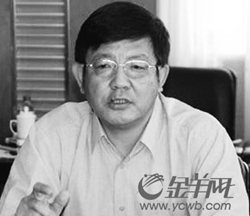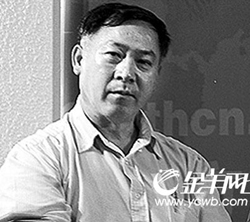|

Zhi Jianhua, a member of the 11th National Committee of the Chinese People's Political Consultative Conference
|
The new Food Safety Law is not the complete answer to loopholes in the regulatory structure, Zhi Jianhua, a member of the 11th National Committee of the Chinese People's Political Consultative Conference (CPPCC) said at a group discussion, China Youth Daily reported on March 9.
"In China, milk production is controlled by agricultural departments, dairy products are overseen by quality control departments, but milk purchasing stations – the key link – come under nobody's jurisdiction," explained Zhi. "That was the precise cause of last year's Sanlu (baby milk) formula contamination scandal."
Zhi Shuping, deputy director of the General Administration of Quality Supervision, Inspection and Quarantine, agreed, saying: "Milk production encompasses many departments and is supervised and controlled by different organizations. The Sanlu scandal exposed the defects in milk testing standards and division of responsibilities between departments."
Xinhua reported that six babies died and 296,000 children became ill due to tainted milk in China last year.
Food adulteration
The Sanlu melamine scandal caused widespread panic and public complaint about food safety. CPPCC members questioned how melamine could find its way into baby formula while quality supervision and control departments insisted they had no knowledge of such adulteration.
"It is ridiculous," said Zhi Jianhua. "Previous testing standards excluded melamine. It is not a problem of standards. It is a problem of adulteration."
Wang Dingmian, an official from the China Dairy Association, said the two main threats to food safety were pollution of raw materials and deliberate adulteration.
"Incidents caused by pollution are relatively few in number. Most were caused by adulteration," said Wang who gave examples such as a fatal alcohol poisoning case in north China's Shanxi Province in February 1998, a milk formula case in 2004 which caused babies' heads to swell while their bodies wasted away, and the Sanlu scandal in 2008.
"Most major food safety incidents are caused by adulteration," he insisted.
Additives also a problem
|

Wang Dingmian, an official from the China Dairy Association
|
Wang said benzoic acid content found in food production over the past years was also related to the testing standard.
"Benzoic acid is a prohibited additive. So the country hasn't tested for its presence in milk powder production over the past few years," said Wang. "When it was found in food, especially baby food, consumers were overwhelmed with panic and anger."
Wang stressed that the new Food Safety Law sets stricter and more scientific requirements for food additives. "Any use of the additives prohibited by state law will be regarded as illegal. However, there are tens of thousands of additives in use by the food industry. Without specific standards, there are bound to be illegal activities."
Zhi Jianhua agreed, saying: "The country lacks appropriate testing standards. The number of testing standards is over 4,000 in developed countries, while there are less than 300 in China. That's why illegal substances such as Sudan Red are found in food products and supervisory departments only find out after the events."
Faulty food processing
In addition to additives, faulty processing also threatens food safety, said Wang Dingmian. "For example, the popular 'flash processing technique' (pasteurization by flash heating) doubles the ash content and sugar acid in milk and endangers people's health, especially their kidneys and digestive systems.
"But the hazardous materials are not detected by existing product testing. The state doesn't have any rules or regulations in this regard. Some enterprises are still using the technique and thus pose a big threat to food safety."
No department responsible for milk purchasing stations
Reacting to Zhi Jianhua's remark on the chaos in China's system of milk purchasing stations, Wang readily agreed.
"There is no specific department responsible for the supervision and control of the quality of milk sources, and this has a vital influence on food safety," he said.
(China.org.cn by Li Jingrong, March 10, 2009)